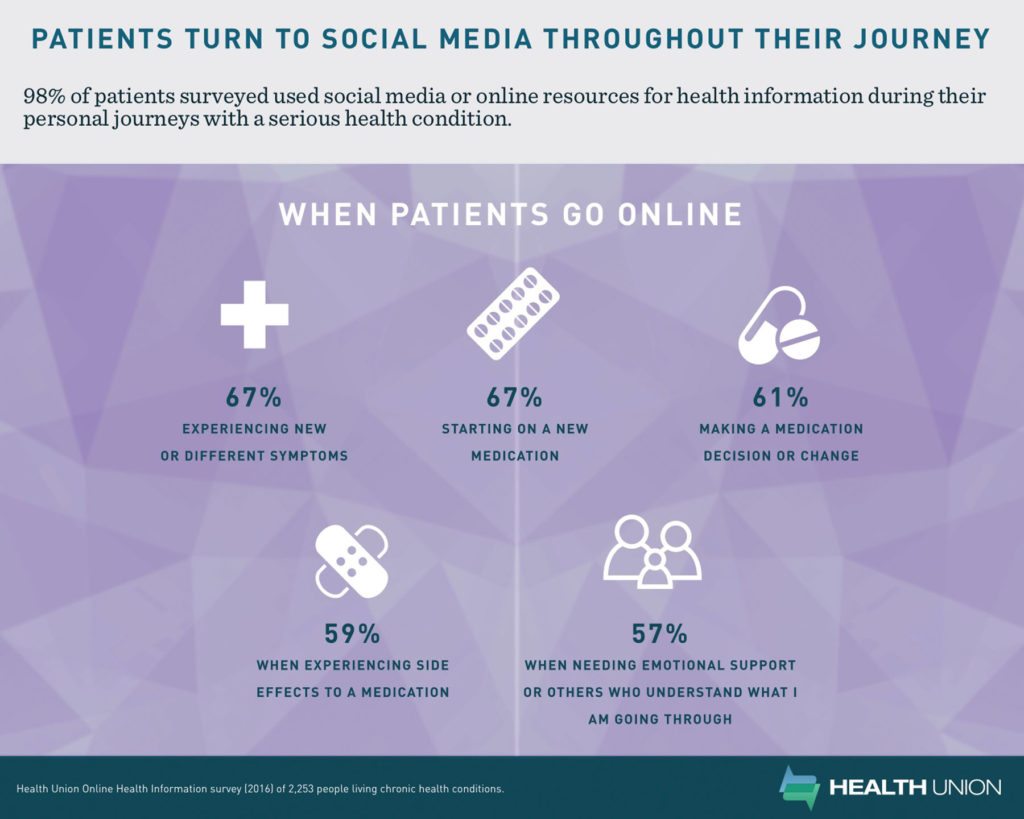A recent report entitled, “Association of Facebook Use with Compromised Well-Being: A Longitudinal Study” published in the American Journal of Epidemiology found that those who used the social media site often were associated “with a likelihood of diminished future well-being.”
Predictably, it led to snarky headlines like “Using Facebook Actually Makes You Feel Depressed, Research Says,” and “It’s Official, Facebook Makes Us all Sad,” but this study doesn’t tell the whole story. While I won’t dispute its methodology or overall conclusion, when it comes to people seeking health information, social media—and Facebook in particular—can have a positive impact and has become a vital resource.
At Health Union, we’ve seen other studies, in particular one from the Pew Research Center, showing that an overwhelming majority (73%) of U.S. adults with at least one chronic condition have sought information online, and among those with multiple chronic conditions, that number rises to 76%. The same Pew study tells us that 29% of those with chronic conditions had read or watched someone else’s health experience online.
We’ve also conducted our own research with more than 2,200 people living with multiple sclerosis, migraine, rheumatoid arthritis, and other serious health conditions, recruiting them using social media posts, website content, and newsletter ads from our patient-centric web destinations. The respondents are active users of social media for health information and told us a lot about how they’re engaging and where they find value, including quotes such as:
“After losing friends by having this disease, I have made new friends in support groups on Facebook who have similar lives to mine.”
A key finding of our survey was that not all online resources and social media sites are created equal. Our research shows that few patients reported using Twitter (11%), Instagram (11%), or LinkedIn (10%) for health information in the past six months.
Twenty-six percent of the patients we surveyed used Facebook once a day or more for health information, and more than half (52%) use it at least monthly. And though condition-specific websites were the most popular online health resources, only 57% used them monthly, with daily use reported at 5%.
Facebook is where people living with challenging health conditions go to meet others who can empathize, and responses such as, “Who is better to ask for information than the very people who experience the problems?” were typical.
“I find comfort in knowing I am not alone with struggles.”
Connecting with other patients to learn about their experiences and having access to condition-specific content makes online resources valuable, and respondents shared thoughts like, “Nobody else understands the pain, fatigue, and frustration better than others who have this disease” and “It’s comforting to know someone else has experienced the same as me.”
We also discovered that when patients ask a question online, they’re most interested in hearing from others with the condition (87%). When they’re posting or sharing content online, half of all respondents said they shared stories to help explain their health condition to others or to offer information about managing or coping with symptoms (37%).
Throughout their health journey, patients rely on online resources such as Facebook and nearly all respondents (98%) turned to social media when encountering specific situations related to their health conditions, including:
- Experiencing new or different symptoms (67%).
- Starting on a new medication (67%).
- Making a medication decision or change (61%).
- When experiencing side effects to a medication (59%).
- When needing emotional support or others who understand what they’re going through (57%).
“I get one-on-one feedback from people with my disease.”
Ninety-seven percent of the patients surveyed said they used the information gathered online during interactions with their healthcare professionals, and 29% reported they use it often. Additionally, 73% of respondents said online health information had “at least some impact” on their health-related decisions.
With all the talk about “patient-centricity” and the role of technology, including social media, in facilitating it, this discussion is really about “human centricity” and the idea that, as humans, relationships matter and long-term relationships matter most. Our survey underscored something we at Health Union already knew—that online health information makes a difference and technology alone can’t revolutionize healthcare. People with serious health conditions are drawn to condition-specific websites and social media sites such as Facebook because the content and the community resonates with them. Patients come back again and again because they find validation, empathy, support, and most importantly, connection. Connection, both human and technological, is vital to healthcare.
Understanding motivations and behaviors provides a roadmap for creating online resources that better meet a patient’s needs and encourage engagement beyond outward advertising. When patients use social media for health-related content, they’re seeking relationships and creating social bonds, whether between those who create it, those who consume it, and the ever-increasing number of those who share it. And because we know some of these patients visit Facebook multiple times daily, these bonds get stronger over time.
Social media, particularly Facebook, has a profound impact for those with challenging health conditions because these relationships exist, and comments from Health Union survey respondents such as, “We all know what the other is going through” and “It’s comforting to know someone else has experienced the same as me” only reinforce its value. So while some may view Facebook only by how many “Likes” a post can gather, we’re looking at how many lives it can influence in a positive way.






